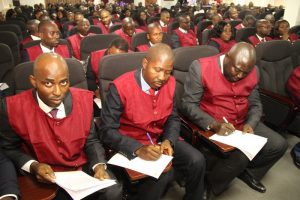
The African Finance Corporation (AFC) on Saturday in Lagos expressed regret over the failure of Nigeria’s power sector to live to popular expectations that followed the unbundling and eventual privatization of electricity generation and distribution.
The blame for this, according to the corporation’s President and Chief Executive Officer, Andrew Alli, should be taken by all stakeholders to the privatization process: the Federal Government, the National Assembly, Bureau for Public Enterprises (BPE) and the investors, among others.
In a keynote speech at the 2017 annual workshop of the Finance Correspondents of Nigeria (FICAN) headquarters in Lagos, Alli, who spoke on the workshop theme: “Financing Nigeria’s Infrastructure: Issues, challenges & options,” lamented the presence of cocktail of problems in power sector in the Nigerian power sector, particularly the capitalization of operators.
Represented by Fola Fagbule, Vice President and head, Financial Advisory at the corporation, lamented that just after the euphoria that greeted the privatization exercise of the then Power Holding Company of Nigeria (PHCN), the stakeholders went into deep slumber.
In the process, he continued, “a lot of momentum was lost after the deals were struck.”
The situation, he stressed, has been made worse because most of the stakeholders simply developed selective amnesia over what they individually agreed to do for improvement in the all-important sector, leading to a situation where many Nigerian corporations and individuals rely on generating sets to run their homes, offices and factories.
Instead, he added, the focus is almost solely on increase in tariffs by the distribution company, while no one is talking about the investments that were promised by them at the point of acquiring majority stake in the assets which was expected to improve poor generation and distribution across the country for the common good.
The event of the past few years in Nigeria, he continued, has shown that privatisation of electricity is not a solution to the problem in the sector, but the need for “scrupulous enforcement of all contractual obligations whether it is by government or the operators.
“The buyers committed to do certain things which should have been enforced just as those of government. There have been no consequences for not doing what they all promised.”
As a way out, Fagbule urged the stakeholders to rather move away from pointing fingers and rather concentrate on resetting the obligations of various parties to the exercise.
It is not too late to achieve some mileage yet, if the stakeholders tell themselves the truth and do a reset, warning ahead that the consequences of this would be difficult and unpalatable on all sides.
An immediate impact of such a reset, he believes, is that raising electricity tariffs will be unpalatable to the customers as they would then have to pay more for what is consumed on a monthly basis.
It would also ensure that distribution companies make investments they promised or risk dare consequences for failure, including losing such assets.
Before then, he believes the stakeholders should first agree on future commitments and take off date of the needed reset, while industry regulator- the Nigerian Electricity Regulatory Commission (NERC) must be adequately empowered to enforce compliance for the overall good and well being of the nation’s economy.
“Increasing tariff is no solution but enforcement of agreement,” he stressed further, just as the NERC must be empowered to focus on enforcement of agreed contracts.
It is also important, Fagbure added, that Nigerian banks must be part of the discussion table, given that the bulk of the funds used by investors to acquire the assets came from the banking system inform of syndicated loans.
Also speaking on infrastructure financing, he lamented that government as a whole is significantly constrained in terms of its ability to spend or even borrow, especially given that it is approaching borrowing limit with a jump in total debt obligation of $54bn.
Referring to the $100bn needed to finance infrastructure over the next 10 years as captured in the Economic Recovery and Growth Plan (ERGP) launched by President Muhammadu Buhari in February, Fagbule wondered: “How is $100bn of funds going to flow in (from foreign investors) when the country’s $54bn total debt burden is already a problem?”
He lamented that 35% of government revenue is already going into debt servicing this year as revealed in the 2017 budget, following which he believes, “it is not in the capacity of the govt to fund infrastructure.”
Meanwhile, for private sector funding to come into fixing Nigeria’s decayed infrastructure, questions that could arise include: “How are tariffs set in Nigeria? If we don’t have economically cost effective tariffs, we are going to eat up the funding, it is about political will,” he stressed.
He called attention to the public procurement approach of getting private investors involved in building and rebuilding critical economic infrastructure where they raise financing independently.
This is the way to go, he believes, if the government desires “to reduce significantly the level of opaqueness in infrastructure ‘concessioning’ to enable people borrow against the financing of government projects even if the government is going to pay back ultimately.
By adopting “Pay for service as against pay for building,” the government, he says would promote transparency.
He also believes much more time should be invested in ensuring diligence in project award process for the country to get more mileage and value for money.
“Ministries should spend more time to do the project analysis to achieve value for money.
“Government should take a different approach to public procurement shifting to service instead of the building.
“Even if you don’t go into PPP, if government can just focus on procurement.”














